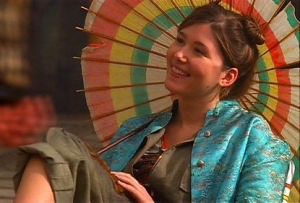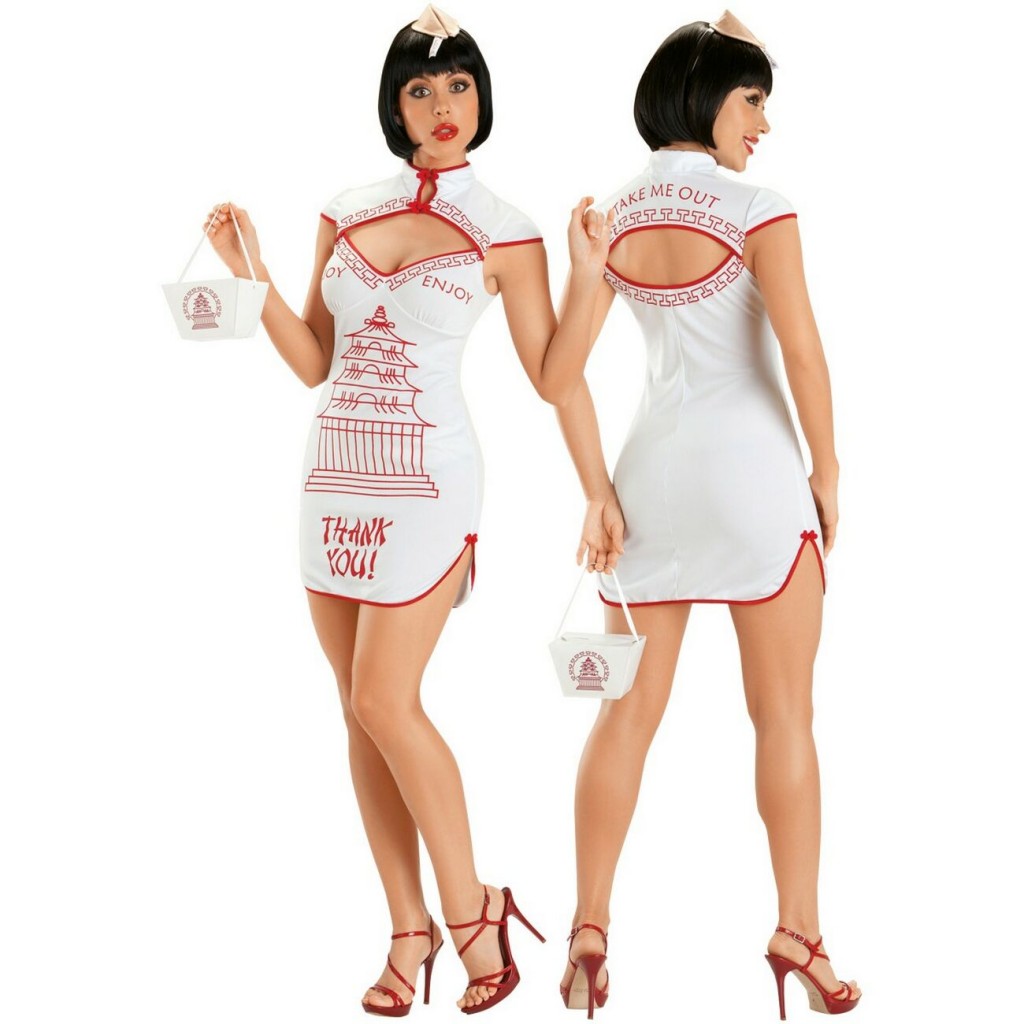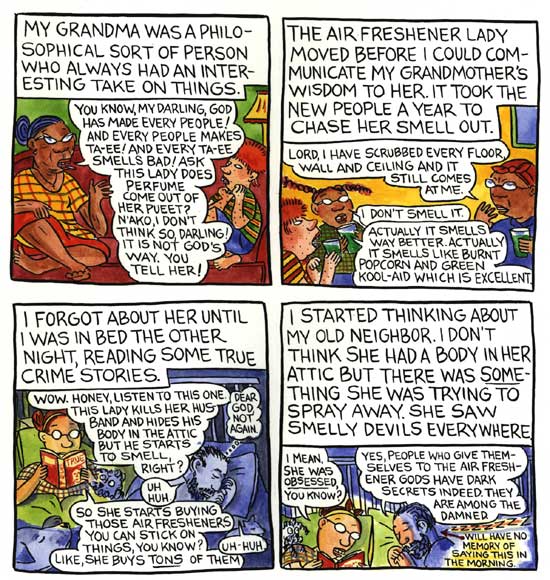This guest post is written by Miranda, a Filipino Australian with a Texan accent who’s used to having confused strangers wonder where she’s from. She likes terrible puns, melting cheese on everything, and long walks by the beach while discussing comic book costumes. She is as tall as the smallest member of the bear family. She can be found on Tumblr.
I’m not completely sure that I want to to watch Firefly. On Halloween, the show entered a list that also includes the Blind Banker episode of BBC’s Sherlock, The Invincible Iron Man #4, and every single whitewashed Asian movie, i.e. The List of Things I Want to Like that Don’t Like Me.
This doesn’t mean that I won’t watch the show, someday. After all, I love Nathan Fillion; I’m a fan of Joss Whedon; I’ve heard the quotes and seen the GIFS. I’ve even admired some of the Firefly cosplay and Halloween costumes I’ve seen, with the exception of Kaylee’s traditional Chinese jacket and parasol, which at first looks like a culturally-appropriative Halloween costume, but is actually something she wears on the show.
I should be surprised that a half-Asian sci-fi universe has no Asians, but I am used to such disappointment. Firefly is yet another show that proves that Western pop culture may love “Asian culture”, but it has no love for Asians. This is no great revelation. In the 1930s, Anna May Wong – the first Asian-American movie star – was passed over for the part of O-Lan in the film adaption of Pearl S. Buck’s The Good Earth. The role instead went to Luise Rainer, a German actress, because of the Hays Code regulations (most of the main Chinese characters in the movie were played by Western actors, in fact). Today, there is always one or another instance of whitewashing to cause outrage. From the 2010 movie adaptation of Avatar: The Last Airbender, to the renaming and whitewashing of Jeff Ma in the movie 21, it sometimes appears that we haven’t progressed much from Anna May Wong’s time. The casual use of “Asian culture” without Asian representation continues to be just as prevalent.
In fact, Western pop culture doesn’t truly love “Asian culture,” which is an entirely simplistic and misguided phrase. What it loves is a stereotypical pan-Oriental culture where all of Asia looks like China Town. All the men are kung-fu masters, triad members or shy nerds with small penises. All the women are dragon ladies or demure geisha girls who want to love you long time. Western pop culture cares about Bollywood dancers and Chinese acrobats. It cares about giggly Japanese school girls and brooding Yakuza members. It cares about pandas and Hello Kitty. It does not care about me.
I know Western pop culture doesn’t care about me because my family is from the Philippines. It doesn’t care enough to note that Asia consists of more than China, Japan, India (and to a lesser extent, North and South Korea.) The Philippines, Indonesia, Malaysia, Singapore, Cambodia, Laos, etc – these other Asian countries may exist as past war zones (Hello, Vietnam!) for attractive white soldiers or exotic vacation spots. Otherwise, they’re just names on a map, barely even registering long enough to produce some well-known stereotypes.
I know Western pop culture does not care about me because I don’t look like a Disney Mulan character. It believes that all Asians look the same: pale, petite, hairless bodies with slanted eyes and black hair. It does not understand that there are no Chinese sweatshops where Asian people are mass-produced and shipped to the West.
I know Western pop culture does not care about me, or any other Asian person I have or will meet, because we are people with complex relationships with our culture, our environment, our society and other people. We have stories that aren’t always about Asians trying to navigate Western culture while still being true to their roots. We have stories that aren’t focused on whether or not we have brought honor to our family. We have stories that still star us without focusing on just how Asian we are.
I have been able to come across only a few worthwhile examples concerning my own Filipino heritage. Jason Atwood from the webcomic Multiplex is one of the few, well-written Filipino characters I’ve seen whose identity involves, but does not revolve around, his ethnicity. Lynda Barry’s book, One! Hundred! Demons! contains many fantastic, truthful glimpses into her own partial Filipina identity. I also only recently heard about the comic book Stone which was published by Filipino artist Whilce Portacio, but I’ve been able to find very little about the actual comic. Considering that there are so many Filipino artists working in the American comic book industry, it shouldn’t be such a struggle to find good examples. What’s more, considering that Filipino-Americans make up the second largest sub-group of Asian-Americans, it shouldn’t be such a struggle to find any examples of Filipinos in geek or pop culture.
It’s frustrating to realize that Western pop culture will churn out the same, tired Asian tropes and characters, but will not recognize the multifaceted complexity of the “Asian culture” it mines for material. It’s like eating Chinese food. It’s cheap and easy to order Westernized Chinese takeaway, but authentic Chinese cuisine offers so many varied regional specialties and cooking styles to choose from. Obviously you still have the choice of ordering cheap takeaway, but why would you only ever order takeaway when there are so many other delicious options available?
I’ll watch Firefly. I will probably enjoy it, lack of Asians and all. It will still be like eating Chinese takeaway, even if it’s the most delicious and satisfying takeaway I’ve ever eaten. No amount of witty dialogue or brilliant characterization will stop it from being the same takeaway Western pop culture serves every single time. And I’m very tired of it.





Angry, wonderful, and oh so true. Thanks for writing this!
I am a ‘westerner’ that has lived in malaysia and singapore for a while. During my stay I did notice the difference between tourist culture and real, average, daily lives of various people I encountered. From my perspective, I can agree with some of the points presented in this article, but I would say that this is not an exclusive trait to western culture. Other cultures in the middle east and the sub-continent, as well as some eastern asian cultures have exhibited this “culture harvesting”. I believe it is a societal, if not human trait. Maybe western culture is just really explicit about it? Not that it’s a good thing..
Miranda, I am hearting your post so much in solidarity. So many fist bumps to you!
Pingback: Borderlands 2 and the White World of Pandora | Geekquality
Pingback: You Can’t Take The Sky From Me: Racebending the Firefly Universe | Lady Geek Girl and Friends